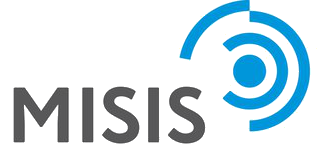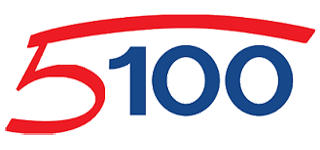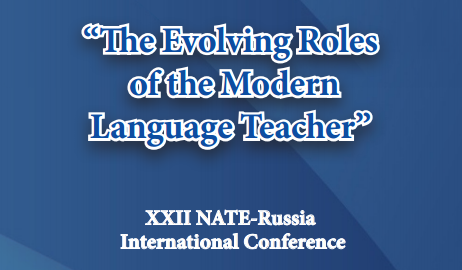April 21-23, 2016
The three-day conference was held in Smolensk on April 21-23 and discussed the latest developments in the field of information technologies in FL teaching, cross-cultural communication, integrating basic and additional language programs, research in language theories and practices, translation and interpreting, teacher development as well as innovative approaches, methods and techniques in ELT. This annual event embraced a wide range of academic and hands-on educational activities such as plenary sessions, presentations, poster sessions, workshops, panel discussions and ELT resources exhibitions aimed at sharing and disseminating the best innovative EFL teaching practices.Many academic experts and representatives from well-known educational organizations were invited to speak at this year’s conference, including Prof. S. G. Ter-Minasova, NATE Founding President; Jerrold Frank, English Language Officer; Ana Maria Ferraro, English Language Fellow; Eve Smith, Consultant in English Language Programming & Writing Center Development; Chris Hastings, English Language Fellow.  More than 400 teachers, professors and English language specialists from all parts of Russia and the USA gather for this grand conference every year to listen to a constellation of fabulous speakers who update the audience on the most recent changes and trends in teaching English to diverse target groups and to discuss current issues and challenges with peers. Everybody interested in the English language and culture as well as in cooperation and establishing beneficial contacts is welcome to participate in the NATE conference.
More than 400 teachers, professors and English language specialists from all parts of Russia and the USA gather for this grand conference every year to listen to a constellation of fabulous speakers who update the audience on the most recent changes and trends in teaching English to diverse target groups and to discuss current issues and challenges with peers. Everybody interested in the English language and culture as well as in cooperation and establishing beneficial contacts is welcome to participate in the NATE conference.
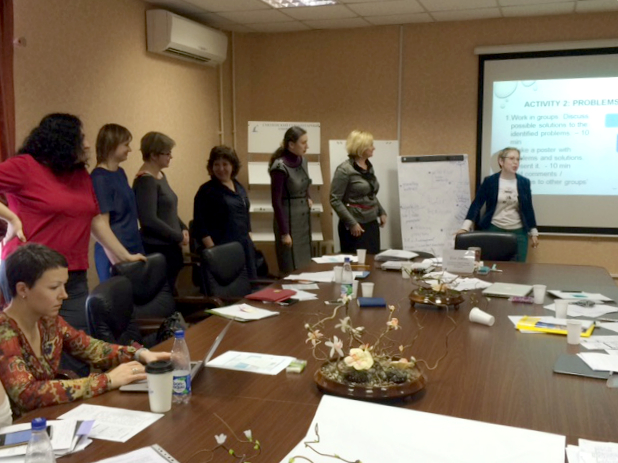 The key question at the conference was following: “What is the Modern Language Teacher nowadays?” An answer to this question is supposed to reveal the culmination of language teacher evolution at present. The present is now habitually called “the era of globalization” and its characteristics feature is supposed to be, among other things, swift, exciting changes and development in almost every sphere of human life and activity.
The key question at the conference was following: “What is the Modern Language Teacher nowadays?” An answer to this question is supposed to reveal the culmination of language teacher evolution at present. The present is now habitually called “the era of globalization” and its characteristics feature is supposed to be, among other things, swift, exciting changes and development in almost every sphere of human life and activity.
 However, the global village peoples still stubbornly speak their national languages. The word stubbornly is supposed to draw attention to the fact that the teacher of the native language which is undergoing great changes under the pressure of the global language and culture is not less urgent and important than the teacher of the foreign language. This is not clearly seen by the peoples of the global language, and the Russian language in Russia – alas – illustrates the underestimation of the problem quite powerfully.
However, the global village peoples still stubbornly speak their national languages. The word stubbornly is supposed to draw attention to the fact that the teacher of the native language which is undergoing great changes under the pressure of the global language and culture is not less urgent and important than the teacher of the foreign language. This is not clearly seen by the peoples of the global language, and the Russian language in Russia – alas – illustrates the underestimation of the problem quite powerfully.
Evolving Roles of The Modern English Teacher
FEATURED SPEAKERS
Jerry Frank (English Language Officer, US Embassy in Moscow)
“Take Out Your Phones! Using Mobile Phone Technology to Support Learning in the Language Classroom.”
Students around the world seem to more attached to their mobile phones than the world around them. Instead of asking students to put their phones away during class time, why not make this technology work for you? This presentation will outline several practical ideas for using ubiquitous mobile phone technology to support learning in the language classroom.
Eve Smith (Samara State Aerospace University, Samara)
“Samara Writing Center Reflections”
Thinking about starting a writing center? This presentation presents a brief historical background of writing centers followed by a discussion of how Samara State Aerospace University adapted the concept and created a functional writing center for a Russian university.
Chris Hastings (ITMO University, Saint Petersburg)
“East Meets West: Motivating Activities for Intercultural Communicative Competence”
After a brief overview of L2 motivation research and motivational teaching strategies, the presenter will discuss the symbiotic relationship between motivation and intercultural communicative competence, and the role they play in language learning. Attendees will learn motiving strategies and activities for incorporating intercultural communication into their classrooms.
Ana Maria Ferraro (Kazan Federal University, Kazan)
“Discussion Circles: Fostering Student Autonomy in the EFL Classroom”
Addressing the full spectrum of skills and sub-skills when teaching EFL can sometimes be a daunting task. Discussion circles initiate an interactive, stimulating, and student-driven classroom environment that easily lends itself to the instruction of virtually any sub-skill. While exposing students to authentic, novel, and meaningful resources, these circles also encourage the entire class to maintain critical discussions in a respectful and independent manner. This workshop aims to illustrate how this kind of interactive activity can effectively build learner-autonomy, language proficiency, motivation, and confidence in our students.
William Smith (Far Eastern Federal University, Vladivostok)
“Speak Up: Presentation Skills in the Classroom for the EL Teacher”
The presenter will review common presentation skills and delivery techniques and how they can be applied in the classroom as teachers. Attendees will be given the opportunity to reflect upon the way in which they present information in their own classrooms, and learn strategies for being a more effective speaker.
Kathy Green (Irkutsk State University, Irkutsk)
“Activities to Balance and Extend Listening Practices”
Listening is an important and challenging part of language learning. As such, learners need balanced and extended listening practice. This workshop will help teachers of English examine their current listening tasks in a new light and offer practical advice on balancing, extending, and improving the quality of learners’ listening practice.
Svetlana Grigorievna Ter-Minasova (NATE President, Moscow State Lomonosov University, Moscow)
“What is the Modern Language Teacher Nowadays?”
An answer to the title question is supposed to reveal the culmination of language teacher evolution at present. The present is now habitually called “the era of globalization” and its characteristics feature is supposed to be, among other things, swift, exciting changes and development in almost every sphere of human life and activity. The words global, globalization nowadays are absolute champions both in popularity and, consequently, in the frequency and variety of usage. Both words, as is well-known, mean something international, relating to whole world, which is now seen – and called – the global village which is defined as “all countries of the world when thought of as being closely connected by modern communications …” (CIDE, p.600). However, the global village peoples still stubbornly speak their national languages. The word stubbornly is supposed to draw attention to the fact that the teacher of the native language which is undergoing great changes under the pressure of the global language and culture is not less urgent and important than the teacher of the foreign language. This is not clearly seen by the peoples of the global language, and the Russian language in Russia – alas – illustrates the underestimation of the problem quite powerfully.
Elena Nikolaevna Solovova (Higher School of Economics, Moscow)
“English Language Teachers’ Professional Competence: Standardized and Alternative Forms of Assessment”
With permanent reforms in the system of general secondary and tertiary education in Russia, the problem of transparent and objectivized forms of assessing professional competence of teachers has become an acute and an urgent issue. Much is being said about shifting traditional roles of teachers and learners. This is inseparably linked with the need to imply new national educational standards and to integrate the development of subject skills with building on students’ cognitive and critical thinking competences. Much attention is paid to enhancing teachers’ academic research capabilities. Yet the system of professional pre-service and in-service teacher training and assessment remains exceptionally traditional and non-transparent, with very poor potential backwash effect on the tasks and objectives stated above. Will the so called ‘EGE for teachers’ solve the problem?
Elena Borisovna Yastrebova (MGIMO University MID Russia, Moscow)
“What EAP Can Do for the Modern English Language Teacher”
English for Academic Purposes (EAP), which emerged in the mother-tongue countries to meet the needs of international students, is slowly gaining ground in this country but for very different reasons. This talk aims to explore the potential of EAP for enhancing the professional development of the EFL teacher in different stages of their career and the effect it may have on the quality of their teaching and their students’ academic achievement. This plenary proposes that EAP should be incorporated in an EFL curriculum at tertiary level both as part of English for General Purposes course (EAGP) and part of English for Specific Purposes (EASP), which would contribute to building up students’ language skills, study skills, and first and foremost, develop their higher order thinking skills. Hence the need for the new EFL teacher well qualified to satisfy these needs. Given that most practicing teachers have little, if any, experience of learning EAP at university, the focus is clearly on in-service training, which involves simultaneous learning, teaching and researching. The talk concludes with the analysis of what the teacher stands to gain based on EAP teacher training course at MGIMO University.
Svetlana Vladimirovna Titova (Moscow State Lomonosov University, Moscow)
“Mobile Technologies for Creating Interactive Environment in Language Classroom”
The workshop is based on quantitative data analysis of the international action research project MobiLL (2013-2014). The participants will get acquainted with the pedagogical potential of mobile apps implementation into ESL teaching. The workshop will present effective strategies, models, and frameworks that will be needed in order to have a sustainable mobile environment in your classroom.
Lilia Vladimirova Bondareva (National University for Science and Technology MISiS, Moscow)
“From Doing Well in English to Doing Well in Life”
Research suggests that the intrinsic motivation among Russian schoolchildren peaks in the 3rd grade, and never increases afterwards. The extrinsic motivation driven by external factors declines steadily from the 3rd to the 7th grade and slips further by the end of the high school. The negative motivation, or failure to attribute any value to learning, rises steadily from the 7th to the 11th grade. This impacts significantly children’s overall achievement at school, and has far-reaching implications for their further studies at the university level. One solution to this is to develop the intrinsic, or subject-driven motivation across the curriculum by stimulating children’svision of their future selves and what it takes to get there. The role of the language teacher is then to help children see well beyond the instant fun of role-plays and games, the immediate benefits of pleasing the teachers and parents, the short-term objectives of doing well in tests and exams, but into the globalizing and digitalizing future where English is an integral part of their successful selves.
Svetlana Anatolievna Suchkova (British Council Teacher Trainer / Samara State University, Samara)
“Academic Writing: Start with Basics”
The workshop is focused on principal problems that Russian learners of English encounter while writing different genre texts in an academic setting.Participants are invited to try and analyze some tasks that can foster better writing. Activities on a paragraph level will be a special emphasis as the paragraph is considered to be a fundamental unit of any type of writing. The materials are based on the presenter’s experience of running writing courses to students and teachers.
Elena Mikhailovna Bazanova (National University of Science and Technology “MISiS”, Moscow)
“Development of Academic Writing Competence”
The development of academic writing competence is a challenge that all Russian universities now face. To cope better with this challenge, some universities offer their researchers tuition on appropriate and effective academic writing through institutional provision on the basis of a dedicated academic writing center, and through non-institutional strategies on the basis of peer-collaboration and tuition.
Aida Sergeevna Rodomanchenko (National Research University Higher School of Economics, Moscow)
“Google Drive as a Course Platform”
This workshops aims at teachers who wish to be in the mainstream of modern educational trends and learn how to incorporate Google Drive into their course, keeping everything in one place (course outline, course materials, students’ grades, etc).
Petr Anatolyevich Stepichev (Russian State Social University, Moscow)
“Surprise Pedagogy: a New Framework for English Language Teaching”
Surprise Pedagogy is a new concept that we introduce to describe a number of principles that should provide foundation for the new type of education. We put forward an idea that true learning starts with surprise as the basic emotion to trigger motivation for acquiring new knowledge and skills. The sources of surprise at the lesson are facts, methods, learning environment and student’s own potential.
Ekaterina Nikolayevna Nechaeva (Vyatka Humanitarian Gymnasium, Kirov)
“Effective Speaking for the Russian National Sate Exam”
Teaching speaking is an essential part of any EFL classroom. Speaking for exams differs greatly from what teachers might demand from students at a regular lesson. What are the secrets of passing the speaking part of RNE successfully? Let us bridge the gap between regular teaching and teaching for exams.
Irina Borisovna Korotkina (Moscow School of Social and Economic Sciences, Moscow)
“Assessing Writing across the Curriculum: Academic Literacy Approach”
Objectivity in assessing students’ academic papers depends not only on the quality and clarity of criteria, but also on the openness of the evaluation process. Academic literacy approach based on the Green 3D model of literacy is aimed at integrating students’ writing practices and teachers’ evaluation techniques.
Valeria Mikhailovna Evdash (British Council Teacher Trainer / Tyumen State University, Tyumen)
“Task-Based Learning”
This workshop gives a brief outline on task-based learning (TBL). Discussion and practical activities will enable the participants to identify TBL approach and its stages. During the workshop the participants will get involved in a mini lesson demonstration of TBL framework in use. The workshop will show the participants how to design a TBL activity that will make learning more communicative and meaningful.
Evgeniy Olegovich Kalashnikov (British Council Teacher Trainer / D.D. Shostakovich School 235, Saint-Petersburg)
“Teaching with Limited Resources”
This workshop aims to assist the teachers in the many countries that have teaching situations where resources are limited. It also aims to counteract the nonenvironmentally friendly tendency in developed countries to view the photocopier as the most important piece of equipment. In this workshop we will examine the different limited resource teaching situations; define the situation; use a video demonstration of a teacher in a limited resource situation to analyse methods and techniques; activate and share participants’ prior knowledge and experience of limited resource teaching situations; and explore a variety of practical activities possible with limited resources.
Eugine Andreevich Kolyadin (Yamalia English Language Teachers’ Association, Gubkinsky, Yamalia)
“The Future of the Digital Teaching”
The workshop covers the process of preparing the material, choosing or creating a template, pages and chapters, adding pictures and interactivity, using videos, texts and digital exercises on the pages of an ebook. The advantages of the iBooks Author platform will be demonstrated by the example of an existing project.
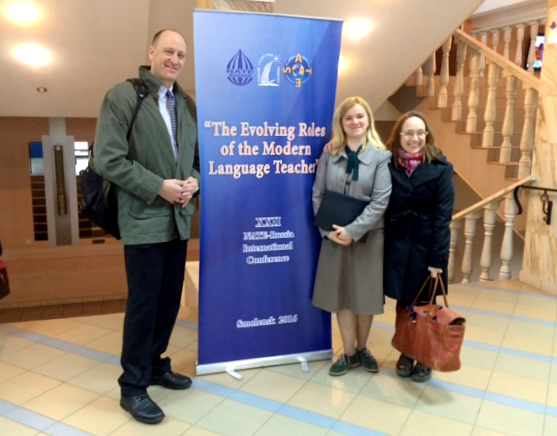 Also was discussed the launching process of the new project “Russian Consortium of Writing Centers” . The aim of this project is facilitate the development of a new professional organization that links scholars and institutions in Russia dedicated to academic writing. It is planned that The Consortium will support Writing Centers in Russia and help to create a favorable environment for professional development and dissemination of best practices in academic writing sector thus meeting the needs and requirements of academic community of Russian universities.
Also was discussed the launching process of the new project “Russian Consortium of Writing Centers” . The aim of this project is facilitate the development of a new professional organization that links scholars and institutions in Russia dedicated to academic writing. It is planned that The Consortium will support Writing Centers in Russia and help to create a favorable environment for professional development and dissemination of best practices in academic writing sector thus meeting the needs and requirements of academic community of Russian universities.
